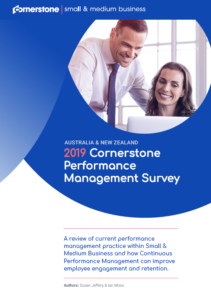HR professionals in Australia and New Zealand share what performance management looks like in their organisation.
Performance management is people management. It represents the way businesses approach the growth, development, and feedback for their people – which is directly linked to the success and growth of any business.
It’s an easy logic line to follow: performance management is something every business should take very seriously and approach with thought and care. Because it isn’t just a term the good folks in HR throw around when it’s time to complete an evaluation form. As people management expert Josh Bersin, founder of Bersin & Associates, says, “[performance management] has to reflect the way you want to run your company, and that’s why it’s so complex.”
You can download Cornerstone’s full results report here.
Times are changing
The approach people take to performance management has been evolving in recent years. Where once a top-down evaluation approach of accomplishments, value, and employee worth was preferenced, now the philosophy has changed so that employees are treated with more respect and humanity.
Research has supported this transformation. Gallup found that employees who receive frequent feedback and have an active relationship with their managers are three times more likely to be engaged at work. The new generations of employees (millennials and gen z) are entering the workforce expecting 50 per cent more feedback than their predecessors.
Times are changing, and businesses have received the message that continuous performance management is the new standard. But knowing something to be true and acting on it are two different things.
It demands the question: businesses know they should be using continuous performance management, but have they been able to make the transition in practice?
Making it happen
Cornerstone OnDemand sought to talk to small and medium businesses about continuous performance management (CPM). We asked 161 HR professionals in Australia and New Zealand how they see the role of CPM and what the current status of performance management is within their company.
It was no surprise that continuous performance management was highly regarded. As one HR professional put it:
“Continuous Performance Management is very important in any business. With more millennials joining the workforce, there is a stronger need to develop, drive and build the younger generation, retain staff and develop a strong retention model to reduce costs and employee retention rates. It is important employees are given the opportunity to grow and improve on their abilities through regular constructive feedback from management.”
However, we found that businesses still have challenges to overcome in implementing continuous performance management.
- 43 per cent only do reviews bi-annually or annually
- 42 per cent say there is a lack of skill set or perceived value by managers
- 42 per cent only conduct regular check-ins to check the status of work
- 60 per cent use excel or other manual processes (like email) to record performance surveys
You can see from our results that continuous performance management is perceived to be valuable, but businesses are struggling to implement a culture of feedback.
 Cornerstone has published the full results of this in-depth survey in a white paper. To learn more about the state of performance feedback today and better understand the obstacles, download the full study here.
Cornerstone has published the full results of this in-depth survey in a white paper. To learn more about the state of performance feedback today and better understand the obstacles, download the full study here.
You’ll also get actionable tips for overcoming those obstacles and implementing continuous performance management in your company today.

